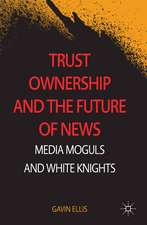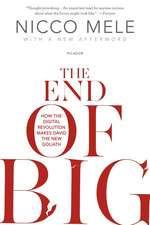Invocational Media: Reconceptualising the Computer
Autor Dr. Chris Chesheren Limba Engleză Hardback – 15 noi 2023
Preț: 540.38 lei
Preț vechi: 774.04 lei
-30% Nou
Puncte Express: 811
Preț estimativ în valută:
103.41€ • 112.29$ • 86.87£
103.41€ • 112.29$ • 86.87£
Carte tipărită la comandă
Livrare economică 22 aprilie-06 mai
Preluare comenzi: 021 569.72.76
Specificații
ISBN-13: 9781501363627
ISBN-10: 150136362X
Pagini: 280
Dimensiuni: 152 x 229 mm
Greutate: 0.54 kg
Editura: Bloomsbury Publishing
Colecția Bloomsbury Academic
Locul publicării:New York, United States
ISBN-10: 150136362X
Pagini: 280
Dimensiuni: 152 x 229 mm
Greutate: 0.54 kg
Editura: Bloomsbury Publishing
Colecția Bloomsbury Academic
Locul publicării:New York, United States
Caracteristici
Rethinks digital technologies by learning how computers, for better or worse, aspire to reduce all mediated cultural practices to invocations - calculations, communications at a distance, cultural memories, spatial experiences and intelligence
Notă biografică
Chris Chesher is Senior Lecturer in Digital Cultures in the Department of Media and Communications at the University of Sydney, Australia, who teaches and researches at the intersection of digital technologies and culture. He has published widely on internet cultures, virtual reality, mobile media, computer games, digital toys, and robotics.
Cuprins
List of Figures and Tables Acknowledgements 1. Invocational Media2. Invoking Concepts3. Invoking Histories4. Invocational Assemblages5. Invoking ActorsConclusionReferencesIndex
Recenzii
Turning away from computational media as "digital" and instead theorizing computers through their capacity to invoke, to call things up and respond, Chris Chesher's Invocational Media provides a staggeringly original perspective on technology that thrillingly reimagines almost all foundations of digital culture.
In a time where we are all mesmerized by the magic of ChatGPT and similar AI technologies, Chris Chesher's book is highly welcomed and timely. Using the concept of invocation and engaging with a wide range of relevant media philosophy, Invocational Media offers an interesting and highly original way to theorize how we design, experience and interact with digital technologies and, more precisely, how they design us. This is an important contribution to the philosophy of media and compulsory reading for everyone puzzled by the mystery of contemporary AI.
Just at the moment when the interactive interface is newly ascendant and we thought that all had been said, along comes this gift of a book. Thinking with the generative trope of invocational media, Chesher refigures the power and limits of computation. Invocational Media offers a history of the present of human-computer interaction, and a proposal for how we can rearticulate its future. It will be of interest to anyone engaged with the invocations, avocations and evocations that comprise relations at and through the interface.
In a time where we are all mesmerized by the magic of ChatGPT and similar AI technologies, Chris Chesher's book is highly welcomed and timely. Using the concept of invocation and engaging with a wide range of relevant media philosophy, Invocational Media offers an interesting and highly original way to theorize how we design, experience and interact with digital technologies and, more precisely, how they design us. This is an important contribution to the philosophy of media and compulsory reading for everyone puzzled by the mystery of contemporary AI.
Just at the moment when the interactive interface is newly ascendant and we thought that all had been said, along comes this gift of a book. Thinking with the generative trope of invocational media, Chesher refigures the power and limits of computation. Invocational Media offers a history of the present of human-computer interaction, and a proposal for how we can rearticulate its future. It will be of interest to anyone engaged with the invocations, avocations and evocations that comprise relations at and through the interface.



















